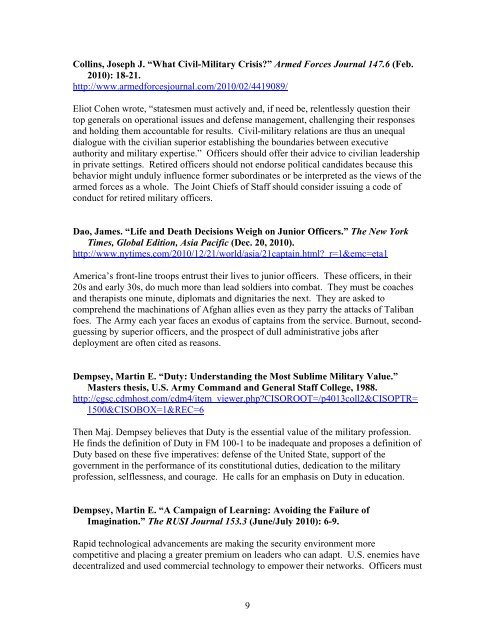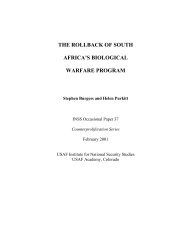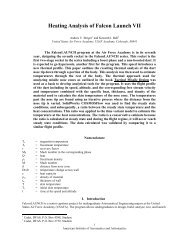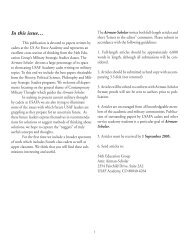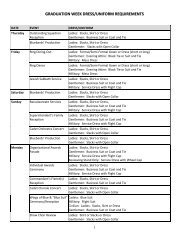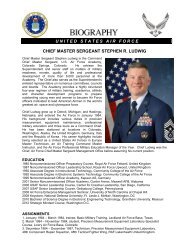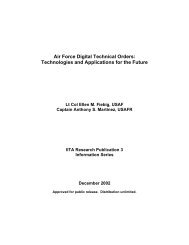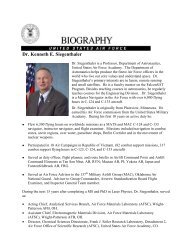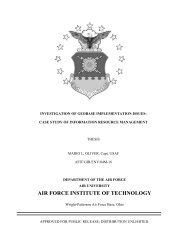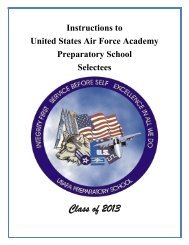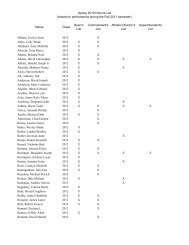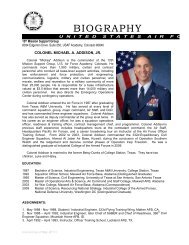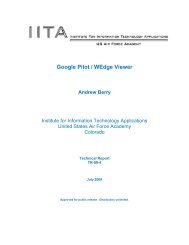Military Professionalism - United States Air Force Academy
Military Professionalism - United States Air Force Academy
Military Professionalism - United States Air Force Academy
Create successful ePaper yourself
Turn your PDF publications into a flip-book with our unique Google optimized e-Paper software.
Collins, Joseph J. “What Civil-<strong>Military</strong> Crisis?” Armed <strong>Force</strong>s Journal 147.6 (Feb.<br />
2010): 18-21.<br />
http://www.armedforcesjournal.com/2010/02/4419089/<br />
Eliot Cohen wrote, “statesmen must actively and, if need be, relentlessly question their<br />
top generals on operational issues and defense management, challenging their responses<br />
and holding them accountable for results. Civil-military relations are thus an unequal<br />
dialogue with the civilian superior establishing the boundaries between executive<br />
authority and military expertise.” Officers should offer their advice to civilian leadership<br />
in private settings. Retired officers should not endorse political candidates because this<br />
behavior might unduly influence former subordinates or be interpreted as the views of the<br />
armed forces as a whole. The Joint Chiefs of Staff should consider issuing a code of<br />
conduct for retired military officers.<br />
Dao, James. “Life and Death Decisions Weigh on Junior Officers.” The New York<br />
Times, Global Edition, Asia Pacific (Dec. 20, 2010).<br />
http://www.nytimes.com/2010/12/21/world/asia/21captain.html?_r=1&emc=eta1<br />
America’s front-line troops entrust their lives to junior officers. These officers, in their<br />
20s and early 30s, do much more than lead soldiers into combat. They must be coaches<br />
and therapists one minute, diplomats and dignitaries the next. They are asked to<br />
comprehend the machinations of Afghan allies even as they parry the attacks of Taliban<br />
foes. The Army each year faces an exodus of captains from the service. Burnout, secondguessing<br />
by superior officers, and the prospect of dull administrative jobs after<br />
deployment are often cited as reasons.<br />
Dempsey, Martin E. “Duty: Understanding the Most Sublime <strong>Military</strong> Value.”<br />
Masters thesis, U.S. Army Command and General Staff College, 1988.<br />
http://cgsc.cdmhost.com/cdm4/item_viewer.php?CISOROOT=/p4013coll2&CISOPTR=<br />
1500&CISOBOX=1&REC=6<br />
Then Maj. Dempsey believes that Duty is the essential value of the military profession.<br />
He finds the definition of Duty in FM 100-1 to be inadequate and proposes a definition of<br />
Duty based on these five imperatives: defense of the <strong>United</strong> State, support of the<br />
government in the performance of its constitutional duties, dedication to the military<br />
profession, selflessness, and courage. He calls for an emphasis on Duty in education.<br />
Dempsey, Martin E. “A Campaign of Learning: Avoiding the Failure of<br />
Imagination.” The RUSI Journal 153.3 (June/July 2010): 6-9.<br />
Rapid technological advancements are making the security environment more<br />
competitive and placing a greater premium on leaders who can adapt. U.S. enemies have<br />
decentralized and used commercial technology to empower their networks. Officers must<br />
9


